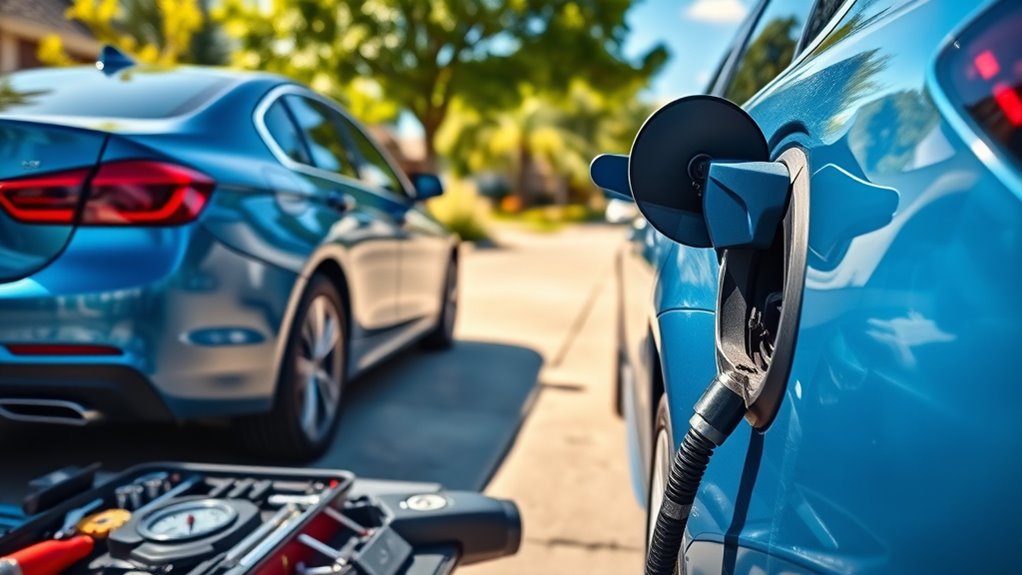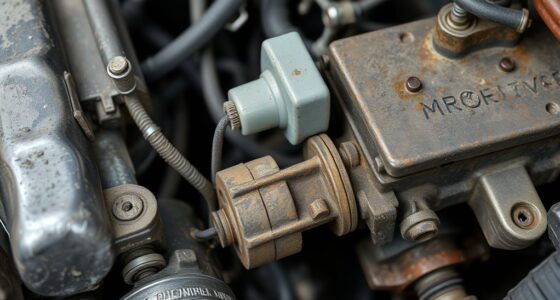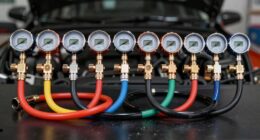To save on fuel, adopt eco-friendly driving habits like avoiding sudden stops, maintaining a steady speed, and using cruise control on highways. Keep your vehicle well-maintained with proper tire inflation, regular engine tune-ups, and timely oil changes. These simple steps can cut your fuel costs and reduce emissions. Small changes make a big difference over time. If you want to discover more tips to maximize savings and stay eco-conscious, you’ll find useful insights ahead.
Key Takeaways
- Avoid rapid acceleration and sudden braking to reduce fuel consumption.
- Maintain consistent speeds and use cruise control on highways for efficiency.
- Regularly check and properly inflate tires to lower rolling resistance.
- Keep your vehicle well-maintained with timely oil changes and engine tune-ups.
- Turn off the engine during long stops to minimize idling fuel waste.

Are you looking for ways to cut your fuel costs without sacrificing convenience? One of the most effective strategies is adopting eco friendly driving habits. This means being mindful of how you accelerate, brake, and maintain your speed. Sudden stops and rapid accelerations burn more fuel, so try to anticipate traffic flow and ease into stops and starts smoothly. Maintaining a consistent speed on highways not only reduces fuel consumption but also minimizes emissions. Using cruise control when appropriate can help you stay steady and save fuel over long distances. Another key aspect is reducing idling time; turn off your engine if you’re going to be stopped for more than a minute or two. This small habit can add up to significant savings over time.
In addition to better driving habits, choosing fuel efficient vehicle choices can dramatically impact your fuel expenses. When shopping for a new car, look for models that are known for their fuel economy. Hybrid and electric vehicles are increasingly popular options that offer eco friendly driving benefits, reducing your carbon footprint and lowering fuel costs. Even within traditional gasoline vehicles, opt for smaller engines or models with advanced fuel-saving technologies. Features like automatic start-stop systems, aerodynamic designs, and lightweight materials help improve overall efficiency. Maintaining your current vehicle’s fuel efficiency is equally important. Regularly checking tire pressure ensures your tires are inflated to the proper level, which reduces rolling resistance and improves gas mileage. Also, keep your engine well-tuned, replace air filters as needed, and ensure your oil is clean. These simple maintenance steps help your vehicle run more efficiently, consuming less fuel and reducing emissions. Additionally, staying informed about celebrity lifestyle insights can inspire eco-conscious choices and motivate you to adopt sustainable habits.
Combine these habits with mindful driving and strategic vehicle choices, and you’ll see noticeable savings at the pump. Investing in eco friendly driving practices doesn’t mean giving up comfort or convenience; it’s about making smarter decisions behind the wheel. Opt for fuel efficient vehicle choices that align with your driving needs, and stick to a routine maintenance schedule to keep everything running smoothly. Over time, these efforts will not only save you money but also contribute to a cleaner environment. Making small adjustments today can lead to big benefits tomorrow, both for your wallet and the planet. Remember, every mile you drive with intention and care makes a difference, helping you stretch your fuel dollars further while supporting a more sustainable future.

Ironman GR906 225/55R17 97H
Designed for use on coupes, sedans, CUVs, SUVs, and minivans
As an affiliate, we earn on qualifying purchases.
As an affiliate, we earn on qualifying purchases.
Frequently Asked Questions
How Does Tire Pressure Affect Fuel Efficiency?
Proper tire pressure directly impacts your fuel economy. When your tires are underinflated, they create more rolling resistance, forcing your engine to work harder and use more fuel. Keeping your tires inflated to the recommended pressure reduces this resistance, improving fuel efficiency. Regularly checking and maintaining ideal tire pressure helps you save money on fuel, enhances safety, and extends tire life. Stay on top of tire pressure for better mileage and overall vehicle performance.
What Are the Best Times to Refuel for Savings?
Refuel during ideal times to maximize savings—early mornings or late evenings when fuel prices tend to be lower, and stay alert to fuel price trends throughout the week. By planning your refuel times around these periods, you can take advantage of fluctuations in fuel costs. Keep an eye on local price trends, and fill up when prices dip, ensuring you get the best value for your money every time.
Do Premium Fuels Improve Mileage?
Premium fuel benefits your car only if the manufacturer recommends it; otherwise, it doesn’t improve mileage. Many fuel economy myths suggest that premium fuels give better performance, but unless your vehicle’s manual specifies premium, you won’t see significant gains. Using regular fuel as recommended helps you save money without sacrificing efficiency. Stick to your car’s guidelines, and don’t fall for the myth that premium always boosts mileage.
How Does Vehicle Weight Impact Fuel Consumption?
Your vehicle’s weight considerably impacts fuel consumption. When you carry extra cargo or have a heavy vehicle load, your engine works harder, reducing fuel efficiency. The added weight increases rolling resistance and engine strain, making you burn more fuel for the same distance. To save money on fuel, lighten your load when possible, remove unnecessary cargo, and avoid overloading your vehicle. Less weight equals better mileage and lower fuel costs.
Can Driving in Eco Mode Significantly Save Fuel?
Yes, driving in eco mode can considerably improve your fuel economy. Eco driving optimizes engine performance and adjusts acceleration, making your vehicle more efficient. When you activate eco mode, your car conserves fuel by reducing power consumption and encouraging smoother driving habits. This simple switch helps you save money on fuel over time and reduces emissions, making it a practical choice for everyday driving.

NSLUMO Auto Start Stop Eliminator/Disabler/Disable for 2019-2024 Chevy Traverse Blazer Malibu Equinox & GMC Terrain Automatic Stop Start Engine System Canceller Auto Shutoff Cable Harness
As an affiliate, we earn on qualifying purchases.
As an affiliate, we earn on qualifying purchases.
Conclusion
By adopting smart driving habits and maintaining your vehicle properly, you can genuinely save on fuel costs. Some believe aggressive driving markedly boosts fuel consumption, but recent studies suggest moderate driving combined with regular maintenance offers the best savings. Remember, it’s not just about habits—your vehicle’s condition plays an essential role. So, stay attentive to your driving style and upkeep, and you’ll see the savings add up over time, proving that mindful driving truly makes a difference.

Electric and Hybrid Vehicles: Design Fundamentals
As an affiliate, we earn on qualifying purchases.
As an affiliate, we earn on qualifying purchases.

Egofine 46 Pieces 1/4 inch Drive Socket Ratchet Wrench Set, with Bit Socket Set Metric and Extension Bar for Auto Repairing and Household, with Storage Case
Durable CR-V with Reinforced Walls:Our CR-V sockets deliver unparalleled reliability and safety by fundamentally eliminating the bursting risk…
As an affiliate, we earn on qualifying purchases.
As an affiliate, we earn on qualifying purchases.









